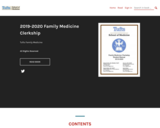
This pressbook corresponds to the curriculum for the Tufts Family Medicine Clerkship.
- Subject:
- Health Sciences
- Material Type:
- Unit of Study
- Provider:
- Tufts University School of Medicine Pressbooks
- Author:
- Tufts Family Medicine
- Date Added:
- 04/03/2020

This pressbook corresponds to the curriculum for the Tufts Family Medicine Clerkship.
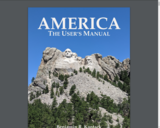
This is a free textbook written for introductory undergraduate courses in American politics and government, covering the creation and principles of the Constitution, the fundamentals of American public opinion and political behavior, and the basic functions of the three branches of government.
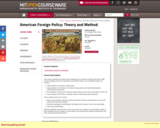
Examines the causes and consequences of American foreign policy since 1898. Readings cover theories of American foreign policy, historiography of American foreign policy, central historical episodes including the two World Wars and the Cold War, case study methodology, and historical investigative methods. Open to undergraduates by permission of instructor.

American Government 3e aligns with the topics and objectives of many government courses. Faculty involved in the project have endeavored to make government workings, issues, debates, and impacts meaningful and memorable to students while maintaining the conceptual coverage and rigor inherent in the subject. With this objective in mind, the content of this textbook has been developed and arranged to provide a logical progression from the fundamental principles of institutional design at the founding, to avenues of political participation, to thorough coverage of the political structures that constitute American government. The book builds upon what students have already learned and emphasizes connections between topics as well as between theory and applications. The goal of each section is to enable students not just to recognize concepts, but to work with them in ways that will be useful in later courses, future careers, and as engaged citizens.
In order to help students understand the ways that government, society, and individuals interconnect, the revision includes more examples and details regarding the lived experiences of diverse groups and communities within the United States. The authors and reviewers sought to strike a balance between confronting the negative and harmful elements of American government, history, and current events, while demonstrating progress in overcoming them. In doing so, the approach seeks to provide instructors with ample opportunities to open discussions, extend and update concepts, and drive deeper engagement.
Changes made in American Government 3e are described in the preface to help instructors transition to the third edition.
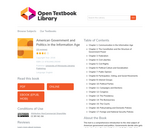
This text is a comprehensive introduction to the vital subject of American government and politics. Governments decide who gets what, when, how (See Harold D. Lasswell, Politics: Who Gets What, When, How, [New York: McGraw-Hill, 1936]); they make policies and pass laws that are binding on all a society’s members; they decide about taxation and spending, benefits and costs, even life and death.Governments possess power—the ability to gain compliance and to get people under their jurisdiction to obey them—and they may exercise their power by using the police and military to enforce their decisions. However, power need not involve the exercise of force or compulsion; people often obey because they think it is in their interest to do so, they have no reason to disobey, or they fear punishment. Above all, people obey their government because it has authority; its power is seen by people as rightfully held, as legitimate. People can grant their government legitimacy because they have been socialized to do so; because there are processes, such as elections, that enable them to choose and change their rulers; and because they believe that their governing institutions operate justly.Politics is the process by which leaders are selected and policy decisions are made and executed. It involves people and groups, both inside and outside of government, engaged in deliberation and debate, disagreement and conflict, cooperation and consensus, and power struggles.In covering American government and politics, this text introduces the intricacies of the Constitution, the complexities of federalism, the meanings of civil liberties, and the conflicts over civil rights;explains how people are socialized to politics, acquire and express opinions, and participate in political life; describes interest groups, political parties, and elections—the intermediaries that link people to government and politics; details the branches of government and how they operate; and shows how policies are made and affect people’s lives.

100+ concise, engaging case studies on various topics in ethics. Case studies cover current topics in digital ethics, free speech, journalism, advertising, public relations, political communication, art, health communication, and sports media. Each case highlights arguments and values on various sides of a conflict, and each case study is available in PDF form with discussion questions and references for further information.
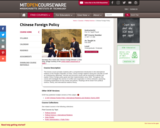
This lecture course provides students with a comprehensive introduction to the international relations of the People's Republic of China. China's foreign relations during the Cold War as well as contemporary diplomatic, security and economic issues will be examined to identify and explain China's foreign policy goals and their implementation since 1949. Throughout, this course will investigate the sources of conflict and cooperation in China's behavior, assessing competing explanations for key events and policies. Readings will be drawn from political science, history, and international relations theory.
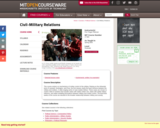
Subject consists of five sections. After a general survey of the field, students consider cases of stable civilian control, stable military rule (coups), and transitions from military to civilian rule. Cases are selected from around the world.
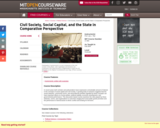
In recent years both scholars and policymakers have expressed a remarkable amount of interest in the concepts of social capital and civil society. A growing body of research suggests that the social networks, community norms, and associational activities signified by these concepts can have important effects on social welfare, political stability, economic development, and governmental performance. This discussion based course examines the roles played by these networks, norms, and organizations in outcomes ranging from local public goods provision and the performance of democracies to ethnic conflict and funding for terrorism.
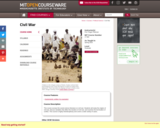
This course surveys the social science literature on civil war. Students will study the origins of civil war, discuss variables that affect the duration of civil war, and examine the termination of conflict. This course is highly interdisciplinary and covers a wide variety of cases.
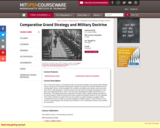
A comparative study of the grand strategies and military doctrines of the great powers in Europe (Britain, France, Germany, and Russia) from the late nineteenth to the mid-twentieth century. Examines strategic developments in the years preceding and during World Wars I and II. What factors have exerted the greatest influence on national strategies? How may the quality of a grand strategy be judged? Exploration of comparative case study methodology also plays a central role. What consequences seem to follow from grand strategies of different types? Open to undergraduates with permission of instructor.
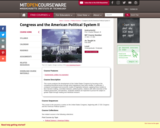
This course analyzes the development of the United States Congress by focusing on the competing theoretical lenses through which legislatures have been studied. In particular, it compares sociological and economic models of legislative behavior, applying those models to floor decision-making, committee behavior, political parties, relations with other branches of the Federal government, and elections. Graduate students are expected to pursue the subject in greater depth through reading and individual research. This course analyzes the development of the United States Congress by focusing on the competing theoretical lenses through which legislatures have been studied. In particular, it compares sociological and economic models of legislative behavior, applying those models to floor decision-making, committee behavior, political parties, relations with other branches of the Federal government, and elections. Graduate students are expected to pursue the subject in greater depth through reading and individual research.
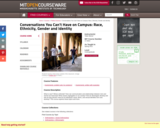
What is race? What is ethnicity? How can communication and relationships between men and women be improved? What causes segregation in our society? How do stereotypes develop and why do they persist? How do an individual's racial, ethnic, and sexual identities form and develop? This course explores these topics and more.
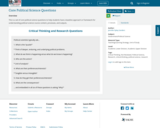
This is a set of core political science questions to help students have a baseline approach or framework for understanding political science course content, processes, and outputs.
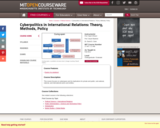
This course focuses on cyberspace and its implications for private and public, sub-national, national, and international actors and entities.
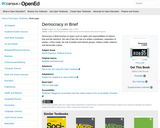
Democracy in Brief touches on topics such as rights and responsibilities of citizens, free and fair elections, the rule of law, the role of a written constitution, separation of powers, a free media, the role of parties and interest groups, military-civilian relations and democratic culture.
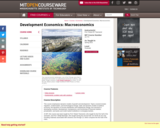
This course emphasizes dynamic models of growth and development. Topics covered include: migration, modernization, and technological change; static and dynamic models of political economy; the dynamics of income distribution and institutional change; firm structure in developing countries; development, transparency, and functioning of financial markets; privatization; and banks and credit market institutions in emerging markets.
At MIT, this course was team taught by Prof. Robert Townsend, who taught for the first half of the semester, and Prof. Abhijit Banerjee, who taught during the second half. On OCW we are only including materials associated with sessions one through 13, which comprise the first half of the class.
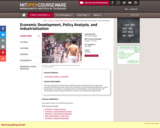
Analyzes the theoretical and historical reasons why governments in latecomer countries have intervened with a wide array of policies to foster industrial development at various turning points: the initiation of industrial activity; the diversification of the industrial base; the restructuring of major industrial institutions; and the entry into high-technology sectors.
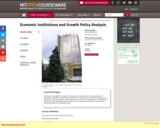
Considers how institutions have been incorporated theoretically into explorations of growth and development. Four sets of institutions are examined in detail: the corporate sector, to study how ownership, strategy, and structure affect growth-related policies; financial institutions, to analyze how they condition savings and investment; labor market institutions, to investigate their impact on the determination of wage and production-related productivity; and the institutions associated with technology, such as universities, research laboratories, and corporate training centers, to consider how skill formulation is accomplished.
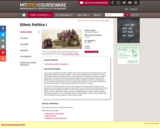
This course is designed to provide students with a broad overview of the major theories on the relationship between ethnicity and politics. The first section discusses ethnicity as a dependent variable. This section studies the forces that shape the development of ethnic identities and their motivating power. The second section addresses ethnicity as an independent variable. In other words, it focuses on how ethnicity operates to affect important political and economic outcomes. Graduate students from all subfields and methodological backgrounds are encouraged to take the course regardless of their previous level of acquaintance with ethnic politics.